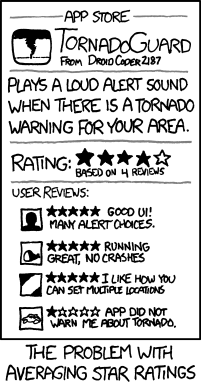Psychologists explained how to persuade people to buy bad goods. It's all about reviews
 The main task of marketers is to import unnecessary goods. They do not shun in any way: they lie in advertising, wind up ratings, use Geektimes and other thematic resources to publish product reviews. The main thing is to create the necessary “information background” from favorable ratings, good reviews and reviews before the contextual advertising campaign. Then a person, if he starts looking for information about a product, will see only the good everywhere. He was trapped.
The main task of marketers is to import unnecessary goods. They do not shun in any way: they lie in advertising, wind up ratings, use Geektimes and other thematic resources to publish product reviews. The main thing is to create the necessary “information background” from favorable ratings, good reviews and reviews before the contextual advertising campaign. Then a person, if he starts looking for information about a product, will see only the good everywhere. He was trapped.No reviews - no sales. This simple slogan is well known to practicing "online huckster". Now it is scientifically confirmed: a group of psychologists from Stanford University, Indiana University in Bloomington, and the University of California at Los Angeles published the results of their research in the journal Psychological Science .
Why is it so important to have reviews for the sale of goods? "Adults and children - like chimpanzees, rats and other mammals - observe the behavior of other individuals, using the result of observations to solve problems and as an aid in decision-making," the scientists explain.
This behavior is understandable. Watching others, there is the opportunity to gain valuable experience that is difficult or dangerous to get yourself. Scientists call this type of training “social learning”: it has a great evolutionary and cultural significance.
')
In modern human society, social education most often manifests itself in economic issues: which restaurant to choose, which brand is better, which product to buy? As in the case of existential questions, here too people tend to observe the behavior of their relatives. Studies have shown that people tend to buy best-selling books and download applications with a large number of downloads.
Marketers are superbly aware of these facts, so in advertising they tend to exaggerate the popularity of the product being “vaporized”. He is assigned epithets like "popular", "famous", "number 1", etc.
The power of social learning and the characteristics of human psychology are in full swing on the Internet. Here there are a lot of tools, where you can find the "rating" of the product and read reviews about it. A group of American researchers studied the impact of these factors on human decision making.
As part of several experiments, scientists found that out of two similar products, people almost automatically choose a product with more reviews, even if both products have low marks. It is curious that this behavior of people, at first glance, contradicts logic.
“Having a choice between two products with low ratings, one with a large number of reviews and one with several reviews, according to statistics, we must in reality choose a product with several reviews, because then there is a greater chance that the product is actually not so bad”, - writes Derek Powell (Derek Powell) from the Department of Psychology at Stanford University, the lead author of the scientific work. That is, there is a possibility that several people may make mistakes by setting low marks. If the number of reviews is large, and the rating is just as low, then there is no doubt about it: the product is really bad. And people tend to choose him.
Instead of logical and mathematically thought-out behavior, people blindly followed the crowd that had already chosen this bad product: “The participants in our research did exactly the opposite. They chose a more popular product, despite the fact that they would have to be more confident in its low quality, ”Powell writes.
In fact, this is an interesting study that shows the vulnerability of the human mind to advertising and marketing. After all, the manufacturer does not need to make a quality product, he needs to make a mass product. And buyers will go for a lot of relatives, regardless of the quality of this product.
Earlier in the North-West University with the participation of the company PowerReviews.com, a study was conducted on a similar topic based on 400 million users. The authors also concluded that the more reviews about the product - the higher the chance of buying it. The optimal number of set 20 (with the desire for 50) reviews. Such a number of reviews gives the buyer confidence that a sufficient number of people have tried the product.
The researchers also found that buyers tend to read bad reviews - they want to find out the worst about the product and make sure that this does not concern them before buying.
According to statistics from Deloitte , 73% of online shoppers said that product reviews are more important to them than its rating. At the same time, the maximum rating is suspicious, and the optimal value is 4.4 points about a five-point scale. These are the nuances of human psychology.

The scientific article was published on August 21, 2017 in the journal Psychological Science (doi: 10.1177 / 0956797617711291).
Source: https://habr.com/ru/post/370761/
All Articles